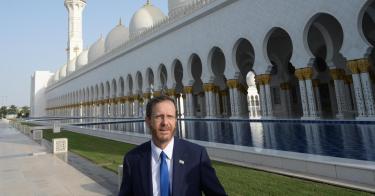For the first time ever, this week, Israel’s president made a visit to the United Arab Emirates. President Isaac Herzog traveled to the UAE and met with Abu Dhabi’s Crown Prince Sheikh Mohammed bin Zayed Al Nahyan.
This is the direct result of the U.S.-negotiated Abraham Accords, which have been paving the way for previously improbable Israeli-Arab cooperation as well as increased trade and investment with the United States.
The Abraham Accords, which President Donald Trump institutionalized in September 2020, have normalized relations between Israel and the United Arab Emirates as well as Israel and Bahrain.
For instance, as Israel and the UAE work more closely together as the consequence of the accords, a major UAE sovereign wealth fund has invested about $100 million in venture capital into Israel’s technology sector, which will solidify pragmatic business and investment ties between the two countries.
It is notable that according to the UAE-Israel Business Council, trade between Israel and the UAE is expected to reach $2 billion in 2022, up from about $250 million annually before the normalization.
Israel and Bahrain also have been interacting with each other constructively since the signing of the accords. Israel began importing aluminum from Bahrain, and the two countries are planning to sign an agreement that allows the transshipment of goods arriving by sea in Bahrain onto planes heading to Israel.
Indeed, as recently noted by the Abraham Accords Peace Institute, a nonpartisan, nonprofit U.S. organization dedicated to supporting the implementation and expansion of the historic peace agreements:
While the historic Abraham Accords have led to an exciting surge in economic ties between Israel and its new Arab partners, the Accords’ promise goes much deeper than bilateral business deals. The peace agreements have the potential to transform the region, creating a new Middle East corridor of prosperity, stability, and trade.
The report further emphasizes,
2022 will be a critical year for realizing this potential. While the Abraham Accords have the potential to transform the region, such a transformation will not happen on its own. We must focus our time, energy and effort on those actions which serve to liberate the economic potential of the Accords, adopt a strategic approach which utilizes the unique contributions of each member, cut through bureaucratic red-tape, and account for integration with global markets.
To that end, Washington can facilitate greater interaction with Bahrain, Israel, and the UAE as a forward-looking economic partner.
The United States has already established a network of trade pacts through free trade agreements with Israel and Bahrain. In addition to better utilizing these existing agreements, Washington can consider connecting these trade agreements to its vibrant economic interaction with the UAE, which is the United States’ single largest export market in the Middle East and North Africa region, with 1,000 American firms operating in the country.
Such an arrangement would create dynamic free trade and open investment linkages among the four nations, jointly benefiting their economies and increasing cooperation.
Needless to say, their private sectors will be critical to the post-pandemic recovery of their respective countries. Washington can further support economic engagement by encouraging a high-level forum convening senior government and private-sector representatives from the U.S. and the Abraham Accords countries.
In addition to bolstering private companies’ interest and participation, an Abraham Accords trade and investment forum can be a public way for Washington to demonstrate continuing commitment to the historic accords.
On that note, the recent launch of the bipartisan, bicameral congressional Abraham Accords Caucus that intends to build on the ongoing success of the agreements is quite welcome as an additional platform for greater engagement through the pact, bolstering the United States’ commitment to peace and prosperity in the Middle East.
As the report by the Abraham Accords Peace Institute pointed out, 2022 should be the year for the U.S., Bahrain, Israel, and the UAE to stand steadfast and continue closer cooperation for advancing their shared interests.
This piece originally appeared in The Daily Signal




